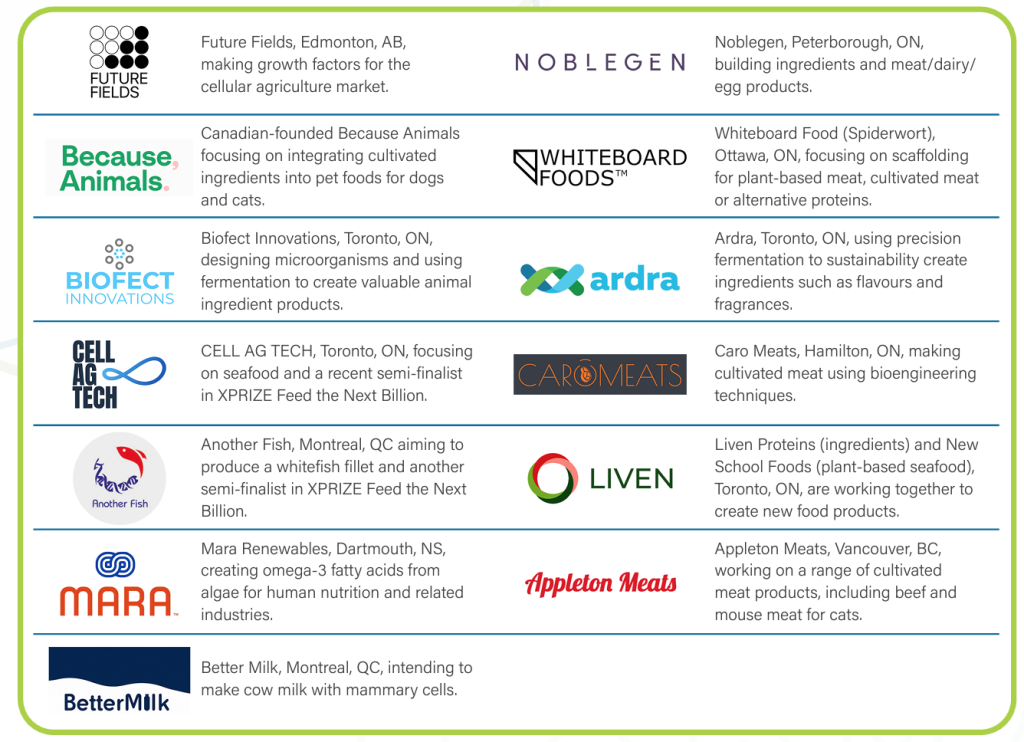In 2019, I co-founded Cellular Agriculture Canada (CAC), a non-profit organization aimed at advancing cellular agriculture in Canada.
To me, it was a no-brainer: I saw Canada and the emerging field of cellular agriculture as entities that could benefit from each other, an untapped win-win opportunity. But for that to happen, we needed to create a landing space for anyone interested in the field. It was crucial to have an organization that could provide a sense of community for those in Canada, that brought together those already working in the field while also welcoming in new players. CAC provided that stepping stone.

Thirteen cellular agriculture companies based in Canada, from Cellular Agriculture: Canada’s $12.5 Billion Opportunity in Food Innovation
About two years into my leadership at CAC, I decided pass on the torch and join New Harvest, leveraging the momentum of their work to carry out the vision that was so important to me.
That’s why I’m so excited that we are officially launching New Harvest Canada Inc.
There are many reasons why I believe Canada is a critical piece of the cellular agriculture puzzle. Here are the five top reasons, for me:
1) Resources
It is the world’s leading exporter of pulses, such as lentils and peas* – the proteins and starches that could feed into precision fermentation and cultured meat processes. The Prairies, the central region where these crops are harvested, can become an ideal place where pilot facilities and R&D centers for cell ag can be set up – right beside where potential critical feedstocks and inputs are produced.
2) Talent
Canada has multiple academic institutions where biotechnology and agricultural expertise co-exist. This opportunity for cross-disciplinary training makes Canada an excellent place to train talent with the unique skills needed in the cell ag industry.
3) A globally recognized reputation for high-quality and safe food
Canada has a world-class reputation regarding the quality and safety of its food. It is the only jurisdiction in the world with one agency safeguarding the whole food supply chain.** The Canadian Food Inspection Agency (CFIA) provides a single point of contact for agri-food producers, processors and consumers, facilitating trade while keeping the highest of standards and scientific rigor.
4) A global test market
Canada is often used as a test market for new products and technologies.*** There are two reasons why. The first is that Canada is fairly similar in culture and consumption patterns to the US, so Canada is a great place for a global brand to make in-roads into North America. On the flip side, Canada also has a highly diverse population because of immigration – it has the highest proportion of foreign-born people of any G7 nation – and because of many groups across the spectrums of income and suburban/urban regions. This wide range of demographic niches and consumer segments makes it a very effective test bed for new technologies and products. For example, McDonald’s pilot-tested its Beyond Meat Burger in London, ON, in 2019!
5) Collaborative granting opportunities
Canada’s private philanthropic sector is a tiny fraction of what can be found in the US, especially when it comes to non-profits in research & technology such as New Harvest. For better or worse, this is a gap filled mainly by the government through provincial and federal grants. Given the current stage of cellular agriculture, combined with New Harvest’s track record, we believe this is the right time to put cell ag on the radar of granting agencies. The launch of the $173M Protein Industries Canada supercluster and Ontario Genomics’ recent report, Cellular Agriculture: Canada’s $12.5B Opportunity in Food Innovation, provide a precedent that Canada’s food-manufacturing sector can become a global powerhouse. Given the scale at which these granting opportunities operate, we think it’s opportune to put them to work building critical infrastructure for cellular agriculture’s next stages of scale up.
In short, Canada can become an ideal place to build critical infrastructure for cellular agriculture, but it will take a lot of policy engagement**** and collaboration.
Many granting opportunities in Canada require multiple stakeholder groups to come together – public and private players, universities, and champions across government agencies. If you, your company, or your organization is interested in expansion into and/or opportunities in Canada, please reach out to me at yadira@new-harvest.org
We believe that cellular agriculture is a gigantic, untapped opportunity for Canada – to the tune of $12.5B/year and 142,000 jobs** – reach out if you want to make this happen!


